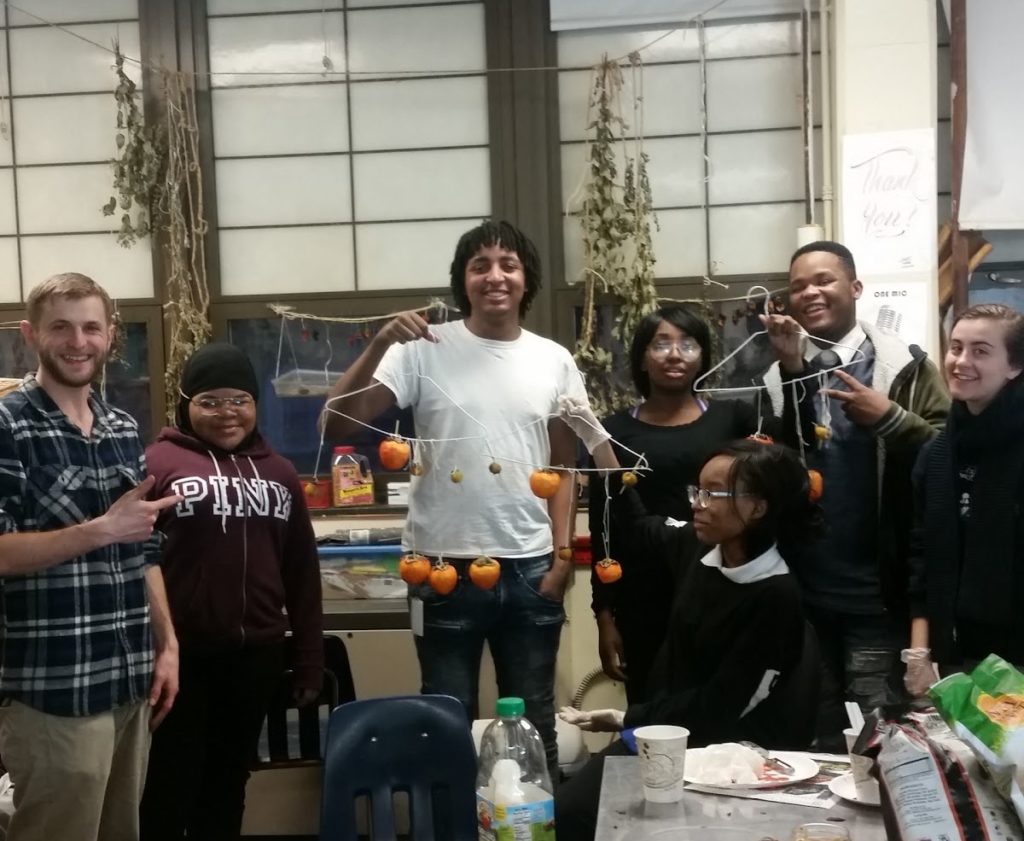In 2018, POP’s School Orchard Program continued to expand in offering unique, engaging, and hands-on learning activities for students, centered in 9 of 12 POP partner school orchards. In total, we offered 26 unique topical lessons, created 6 downloadable lesson and material packs for teachers to use in their classrooms, made 440 total student impressions through staff visits and lesson plan delivery, and created pre- and post-school year surveys to collect orchard metrics that have value for structuring our programming. All of our delivered programming is centered around our school partners’ learning objectives of those of their students and communities.
Last year, we developed and delivered lessons on key orchard fruits and pollinator orchard herbs like blackberries, persimmons, bee balm, anise hyssop, and thyme, that have high nutrient and medicinal value, are well-adapted to this growing region, propagate easily, and have promise for small-scale home or community food production. Students at Sayre High School in West Philly and Richard Allen Preparatory School learned the Japanese traditional persimmon string-drying method of hoshigaki. We experimented with the astringent Hachiya and non-astringent Fuyu varieties, finding them to work equally as well, and less so with the American persimmon, whose softer flesh makes it better suited for puddings and breads!

In 2018, we also honored the life of Roseann McLaughlin, the beloved, foundational visionary behind Overbrook School for the Blind’s Farm-to-Table Program. Continuing in her legacy through GrowAbility, we continued to work with a consortium of 10 organizational partners working to adapt orchard and agricultural curriculum for special needs students. POP created sensory lesson books and tactile prop boxes on honeybees, worms, apples, and herbs of the orchard understory, which are being adapted and replicated at partner sites all over the city.
Using art, dance, and music, we delivered kinesthetic-focused lessons at new orchard partners like William Cramp Elementary School in North Philly, where students learned about root structures while tending to the weeds in their school’s orchards and danced the different structures they found! With support from Mural Arts, students also made collaborative exquisite corpse drawings, drawing themselves as part-humans, part-plants while learning about the functional parts of plants. With retired-but-returning teacher Dr. Ruiz, an incredibly knowledgeable resource and student advocate, students learned how to make egg shell gardens and how to seed plants from avocado pits, a common staple for many of the school’s students. We continue to use art to facilitate students’ understanding of the natural and built environment.
In 2019, POP’s School Orchard Program has identified two key learning initiatives: education around protecting pollinator habitats, and work on natural dyes and pigments. This winter, we’re welcoming 4 undergraduate environmental studies students from Swarthmore for 10 weeks, who will be working with us on researching the crisis of pollinator population decline and ways we can intercept through the seeding of useful host plants. We’ll be working on a large seed ball project to seed these plants in the gardens and understories of our school partners, in addition to making these resources available to the wider community. We’ll be piloting a natural dyeing component with several schools this year, which will include a fall student showcase. This year we’ve also begun to work more closely with the Mayor’s Office of Education; through their work with community schools and includes several of our school partners, we’ll be creating a database of some simple garden projects for teachers and students, and sharing our newly created nutrition and recipe cards for use with classrooms and school food pantries, available in both English and Spanish (with special thanks to Camille Crane of Casa del Carmen for translating!).
If you are interested in getting involved in any of these school orchard initiatives, please reach out to Education Director Alyssa Schimmel, alyssa@phillyorchards.org
SUPPORT US! If you found this entry useful, informative, or inspiring, please consider a donation of any size to help POP in planting and supporting community orchards in Philadelphia: phillyorchards.org/donate. Our School Orchard Program is funded in part by the Lawrence Saunders Fund and the Rosenlund Family Foundation.